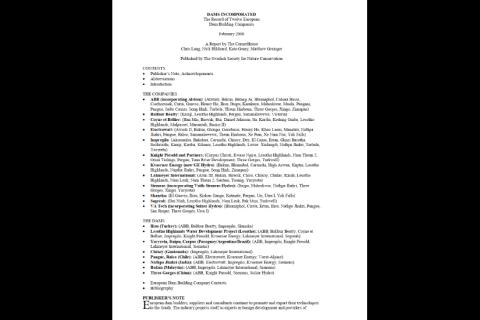The expansion of tree monocultures in Tasmania -which is paradoxically the centre of origin of Eucalyptus globulus, one of the most widely used species for establishing monocultures throughout the world- under the Clean Development Mechanisms of the Kyoto Protocol is provoking widespread concern in Australia.
Other information
Forestry companies worldwide are enthusiastically trying to implement the idea of establishing tree plantations in Southern countries under the Clean Development Mechanisms of the Kyoto Protocol, signed in 1997, allegedly as a way of sequestering CO2 from the atmosphere to mitigate the effects of global warming ... and of making good profits at the same time. Even if presented as "environmentally friendly", the whole idea of plantations as carbon sinks is based on weak scientific arguments and does not constitute an effective way of reducing CO2 concentrations in the air.
Genetically engineered trees are a new threat pending on native forests and other ecosystems worldwide. The development of "Frankentrees" is being promoted by joint-ventures formed by biotechnology, chemical and paper giants, together with some of the world's largest landowners. Monsanto -which has a long dark history in the field of genetically engineered food- ForBio, International Paper, Fletcher Challenge Forests, GenFor, Canada Interlink, Silvagen, the Chilean Development Agency, Shell and Toyota are some of the firms involved in the development of this technology.
The Tupinikim and Guaraní of Espirito Santo, Brazil, have been struggling for years against powerful Aracruz Celulose in order to defend their traditional lands, that the company started to occupy in 1967. After having suffered intimidation and violence to the hands of the company and the military, and having taken direct actions of occupation of the lands that historically belong to them, in April 1998 the Tupinikim and Guaraní were forced into signing an agreement with the company, which was valid for a period of 20 years.
The World Bank is not a monolithic structure and many staff members are increasingly aware about the impacts that large-scale tree monocultures have on people and the environment. However, there are signs that within the Bank's higher hierarchies there is a will to promote such plantations, either as carbon sinks or as providers of raw material for the paper, timber and palm oil industries.
A Report by The CornerHouse. Chris Lang, Nick Hildyard, Kate Geary, Matthew Grainger. Published by The Swedish Society for Nature Conservation.
European dam builders, suppliers and consultants continue to promote and export their technologies to the South. The industry projects itself as experts in benign development and providers of economic prosperity, implying that its work has been tested and perfected at home.
The World Bank is apparently willing to play a major role in the promotion of tree plantations. This can mean good or bad news, depending on the type of plantations it is willing to promote. The country studies provide useful -though incomplete- information on the issue, which we believe the Bank should use as a starting point for its own research on the positive and negative impacts of different types of plantations. It appears clearly that large-scale monoculture tree plantations should not be promoted, given their negative environmental impacts and their few positive social effects.
The social and environmental impacts of tree monocultures in the Andean Páramos of Ecuador in a project carried out by the Dutch consortium FACE are analyzed in a thesis work for a PhD in Environmental Sciences of the Universitat Autónoma de Barcelona, Spain. The author -Verónica Vidal- worked during several months in that grasslands region of Ecuador, inhabited by indigenous peasants, and which is capital for the maintenance of the hydrological cycle and as well as hosting high levels of biodiversity.
The WRM has just published a new Plantations Campaign briefing titled "The carbon shop: planting new problems" by Larry Lohmann. This is the third briefing in our series in relation to tree monocultures, and, as the previous ones, it aims at facilitating understanding of the plantations issue by a wider public and can be used to influence journalists and international fora, to organize public discussions, and to raise awareness within communities facing the hegemonic forestry model.
Impacts of tree monocultures are usually analysed under two broad headings: environmental and social. The former involves impacts on water, soil, biodiversity and landscape, while the latter includes social and economic impacts. Though useful as an analytical tool, such division can however hide the fact that all impacts are -in the short or in the long run- social, since it is local people who live nearby plantations or who are displaced by them who suffer the consequences.
Because of Aracruz Celulose's move to apply for FSC certification for its eucalyptus plantations in the state of Bahia -avoiding at the same time the polemic issue of the dispossesion of Guarani and Tupinikim's lands as a consequence of the company's plantations in the neighbouring state of Espirito Santo- a large number of concerned organizations and individuals held a seminar last October in Vitoria, Espirito Santo, to analyse this menacing scenario.
Last November we received a message from the Tasmania based NGO Native Forest Network-Southern Hemisphere (NFN), informing that the Australian giant North Ltd. was planning to invest in pulpwood plantations in Uruguay.

